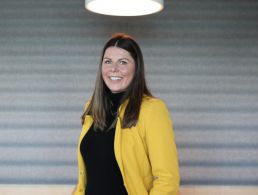Remote working isn’t for everyone, according to BT’s Gillian McMahon. But focusing on communication and wellbeing can make a big difference.
As head of HR at BT Ireland, Gillian McMahon is responsible for the development and implementation of the company’s strategies and people plans. Until Covid-19, her role had mainly been office-based, but luckily she was already familiar with some of the intricacies of working from home.
Here, she explains how she has adapted in recent months and highlights the importance of company wellbeing initiatives right now.
‘As I no longer bump into someone throughout the day, every conversation and decision has to be booked in the diary to take place’
– GILLIAN MCMAHON
Have you always worked remotely? How has your work style at BT adapted?
Prior to the pandemic, I worked on average one day a week from home. BT Ireland has had a flexible working ethos for over 10 years now, so we had been well ahead of the curve in being ready for more remote working when the pandemic arose. I now work from home full-time along with most of our workforce. We spend considerable time each day meeting through video links, which is important to maintain contact with my team and wider colleagues across the business.
Which skills have you found to be most important for working remotely?
Communication was always a key skill in our business, however it is crucial now more than ever before. It’s important to keep in contact with your team. As I manage people, it’s important to maintain regular contact with each person and do our best to keep people motivated and know that they have people to rely on should they need any help. We also have an excellent communication plan throughout the pandemic to keep people updated on our plans to reopen, taking into account Government and HSE guidelines.
What were the biggest surprises or challenges you have encountered while working remotely, and how did you overcome them?
I have found that working from home every day is quite monotonous because I usually don’t leave the house until the end of the working day. From the start, I have found it important to get up every day, get ready for work, take small breaks, stop for lunch and I aim to finish at a reasonable time each day.
The main surprise I have encountered is that I didn’t realise how many conversations happen and decisions get made – sometimes on the move – throughout my work building. As I no longer bump into someone throughout the day, every conversation and decision has to be booked in the diary to take place, which is more difficult to fit in.
How do you stay productive when remote working?
I stay productive as most of my day is spent on calls or video links. Maintaining contact with colleagues throughout the day keeps me productive.
What are some tools and techniques you’ve found particularly helpful while working remotely?
Having the right technology is really key and by using the tools we have in BT, I can do all aspects of my job from home. It’s important to stay motivated to do my job but also to finish work each day and take time off. Taking annual leave is still important, even if we can’t currently take a holiday abroad.
What do you most enjoy about doing your job remotely?
The one thing I enjoy most about remote working is that I don’t have to commute to the office. I have spent between one and one and a half hours travelling each way to work in the city centre for the last 15 years, so it’s a nice change to no longer spend that amount of time in traffic.
Is remote working something that suits everyone, do you think?
Remote working is not something that suits everyone. There are definitely positive aspects to remote working, such as less time commuting. However, for many people, it can be lonely, isolated, tiring and a real struggle for people living and working on their own or others who are struggling to balance childcare and other caring responsibilities.
It’s really important to focus on wellbeing. With our employee assistance programme and wellbeing programmes, we continue to review what assistance we can offer to our people as best we can during these challenging times. We’ve also really maintained momentum on our employee engagement plans too, trying to be innovative in organising activities that help underpin our purposeful culture, like fundraising and volunteering in a fully virtual format.




